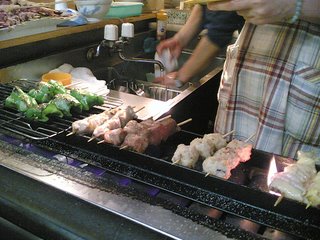Food news
If you watched Japanese TV last night you saw a lot of beef! Yoshinoya had a one-day-only sale of its popular dish, gyudon. Long lines outside... Sales officially starts October 1 after more than 2 1/2 years, due to concerns about mad cow disease in American cattle. Lots of photos of the long lines here. Crazy.
Also, Asahi reported that 26% of chicken farms accross Japan that were tested by the Japan Poultry Association had salmonella. It seems such tests are not done by the government, like in Europe, and this was the first test on a nationwide scale. Other studies indicate that about three out of 10,000 eggs are infected with salmonella in Japan. The Asahi has the story: Salmonella found in 26% of egg farms
The results of JPA's survey were compiled into an unofficial report in March last year, but the JPA did not publicize the results.
"We did not want to give consumers the misunderstanding that many eggs are contaminated," an official said.
The Asahi Shimbun recently obtained a copy of the unofficial report.
The report said there are about 3,600 layer farms in Japan. The JPA chose 10 percent of them for the survey, among which 204 cooperated.
The farmers each submitted droppings of 50 hens, as well as samples of dust from ventilation openings and the fans of their henhouses.
Salmonella was detected in the droppings from 15 farms and in the dust samples of 48 farms. Nine farms had the bacteria in both the droppings and the dust, the report said.
In total, salmonella was found in 54 of the 204 farms, or 26.5 percent. Twenty-seven of the infected farms were large-scale ones that keep more than 100,000 hens.
The United States and some European countries conduct nationwide salmonella surveys on a regular basis.
However, Japan has not done so.
According to experts, hens infected with salmonella pass the bacteria on to less than 10 percent of their eggs.
Experts say the salmonella bacteria do not increase if the infected eggs are kept at 10 degrees or lower, meaning the possibility of people suffering from food poisoning after eating the eggs is low.
In addition, the bacteria are destroyed if the eggs are heated at 65 degrees or higher.
However, Haruo Watanabe, a vice director of the National institute of Infectious Diseases, said: "The results of the survey back up the situation that about three out of 10,000 eggs are infected with the bacteria in Japan.
"Consumers should recognize that it is difficult to completely remove salmonella, which exists in the natural environment, from poultry farms."
Not wanting to worry the consumers? That is such a lame excuse. Do the tests, fix the problems, and then let consumers decide if they want to worry or not. Japan has its share of unhygienic farms and restaurants, but actually, I have never gotten the stomach flu or any infection here (yet). It also means I avoid places like this:

(Photo of a dirty yakitori stall in Shinjuku from Kanagawa Ken's Flicker Page, used with permission)
Also, Asahi reported that 26% of chicken farms accross Japan that were tested by the Japan Poultry Association had salmonella. It seems such tests are not done by the government, like in Europe, and this was the first test on a nationwide scale. Other studies indicate that about three out of 10,000 eggs are infected with salmonella in Japan. The Asahi has the story: Salmonella found in 26% of egg farms
The results of JPA's survey were compiled into an unofficial report in March last year, but the JPA did not publicize the results.
"We did not want to give consumers the misunderstanding that many eggs are contaminated," an official said.
The Asahi Shimbun recently obtained a copy of the unofficial report.
The report said there are about 3,600 layer farms in Japan. The JPA chose 10 percent of them for the survey, among which 204 cooperated.
The farmers each submitted droppings of 50 hens, as well as samples of dust from ventilation openings and the fans of their henhouses.
Salmonella was detected in the droppings from 15 farms and in the dust samples of 48 farms. Nine farms had the bacteria in both the droppings and the dust, the report said.
In total, salmonella was found in 54 of the 204 farms, or 26.5 percent. Twenty-seven of the infected farms were large-scale ones that keep more than 100,000 hens.
The United States and some European countries conduct nationwide salmonella surveys on a regular basis.
However, Japan has not done so.
According to experts, hens infected with salmonella pass the bacteria on to less than 10 percent of their eggs.
Experts say the salmonella bacteria do not increase if the infected eggs are kept at 10 degrees or lower, meaning the possibility of people suffering from food poisoning after eating the eggs is low.
In addition, the bacteria are destroyed if the eggs are heated at 65 degrees or higher.
However, Haruo Watanabe, a vice director of the National institute of Infectious Diseases, said: "The results of the survey back up the situation that about three out of 10,000 eggs are infected with the bacteria in Japan.
"Consumers should recognize that it is difficult to completely remove salmonella, which exists in the natural environment, from poultry farms."
Not wanting to worry the consumers? That is such a lame excuse. Do the tests, fix the problems, and then let consumers decide if they want to worry or not. Japan has its share of unhygienic farms and restaurants, but actually, I have never gotten the stomach flu or any infection here (yet). It also means I avoid places like this:

(Photo of a dirty yakitori stall in Shinjuku from Kanagawa Ken's Flicker Page, used with permission)

Comments